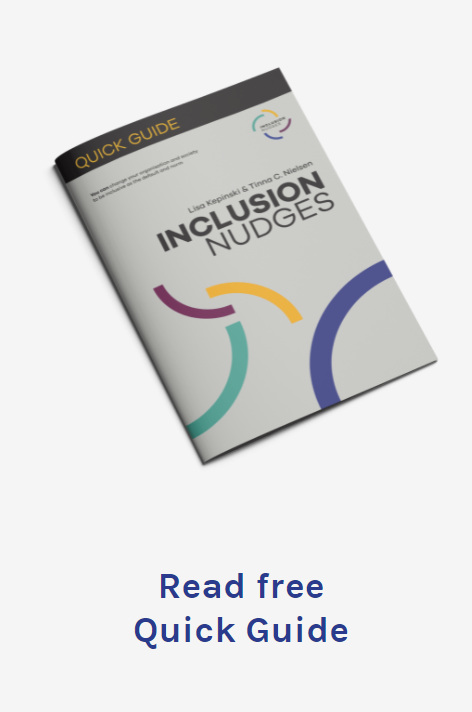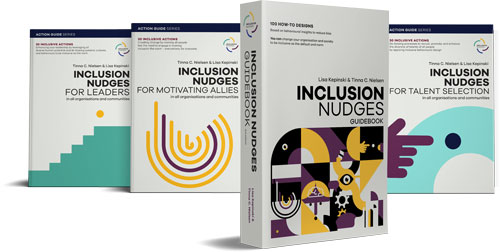Tinna Nielsen and Lisa Kepinski, co-founders of Inclusion Nudges, contributed this guest post on psychological safety.
Psychological safety is triggered by inclusive actions. Groups with behavioral norms supporting psychological safety, have higher team performance, innovation, growth, retention of talents, trust, collaboration, and a sense of belonging. Here are 3 Inclusion Nudges that you can do to support and benefit from psychological safety within your group—and anyone can do these.
What is psychological safety and why do we want it?
Over 30 years ago, William Kahn published about the conditions for freely sharing your full potential at work and the link to higher engagement when this happens. Amy Edmondson, a professor at Harvard Business School, has continued for decades this area of research with many publications (hear directly from her in this TEDx talk on building a psychological safe workplace).
Essentially, what Kahn, Edmondson, and others have described is feeling able to openly share your full contributions without fear of negative consequences. This mirrors how diversity, equity, and inclusion (DEI) practitioners sum up when an organization is truly inclusive. It is when we all are able to be ourselves and contribute fully, feeling respected, valued, and empowered. And we give this feeling to others as well—what we do by giving and reciprocity helps to shift cultural norms to be more supporting of psychological safety for all.
Organisational leaders have identified psychological safety as one of their key priorities. Indeed, research by Google showed it to be the main contributor to higher team performance, and other research has pointed that psychological safety is a key predictor of profitable financial earnings, greater innovation, and higher customer advocacy. Trust and respect are the keys to achieving psychological safety within a group.
Yet, how can we do this? Here are 3 simple actions that any of us can do at any moment in our teamwork.
3 inclusive actions to support psychological safety
We see psychological safety when people
- feel free to express their views, even when contrary to the prevailing view,
- are able to open up about who they are and their experiences without a filter of fear of sanctions,
- feel acknowledged and appreciated for their contributions.
This is when our best is brought out through high trust to be vulnerable and share, respect for each other, and using our full knowledge and abilities. This benefits each of us and the groups that we participate in.
Yet, achieving psychological safety is a challenge for many groups. Edmondson’s research shows when work is framed as a learning problem (not an execution problem), this creates curiosity and supports inviting and hearing all views. Equally important is to create psychological safety by acknowledging our own fallibility (and we all are driven by cognitive shortcuts making us imperfect). These steps seem like they should be easy to do, right?
But, all too often, we work (and are evaluated) in ways that are focused on quickly accomplishing tasks. This can maintain norms of how work happens (how problems are perceived, who speaks, who is heard, what is considered, how input is received, and more). To overcome the hidden barriers to achieving psychological safety, here are some Inclusion Nudge designs that you can adapt to your situation. Why not give these a try in your next team meeting? We’re curious to hear from you on how does it go.
Prompt empathic perspective taking in yourself and others
To signal to others and be open to hearing about different experiences and views, one approach that works is perspective taking.
This is when we try to understand someone from their experience rather than from our own.
‘Flip Questions’ are an excellent proven technique that we all can do spontaneously to help with perspective taking. Our hidden cognitive shortcuts (biases) can limit how we see other people and how we engage with them. Without realising, we are driven by implicit associations and stereotypes. This can cause us to box people into something that they are not. We miss out on seeking more about them. As a result, our unreflective thinking can limit psychological safety. The ‘Flip Questions’ action helps to literally flip our perspective in the moment, such as by asking:
“If he were a she, would I have asked more questions about how he is coping with family issues during the pandemic?”
or
“If she were more extroverted rather than introverted, would I have given a stronger endorsement of her idea?”
We (Tinna and Lisa) use these constantly ourselves in our work, and we also hear from others on how effective this Inclusion Nudge is to their inclusive leadership. You can do this design both with yourself and within a group. And if you’re a leader, talking about your own vulnerabilities such as misjudgements revealed by ‘Flip Questions’ is a way to set the tone for trust giving—one of the foundations for psychological safety.
You can learn more about this design called Ask Flip Questions to Change Your Perceptions in the Moment in The Inclusion Nudges Guidebook, Inclusion Nudges for Talent Selection, Inclusion Nudges for Leaders, and Inclusion Nudges for Motivating Allies.
Use designs to facilitate greater connection with people in a group
Connecting with group members fosters stronger cohesion, inclusivity, belonging, and psychological safety which supports higher productivity, engagement, and retention. Yet, many groups prioritise task over connection.
So, we need to use designs that ensure connection happens. This is even more the case with distributed teams working in new ways (online and hybrid models). Make sure to schedule time in team meeting agendas for connection. This ensures that it happens and also signals that it’s an important team function valued by the leader.
One connection enabler is group check-ins which can simply be an opening question like “How’s the weather where you are?” or an anonymous question to gauge how the people on the team are doing (feeling, performing, etc.). This can also incorporate some survey questions to measure psychological safety within the team (use your organisation’s existing framework of questions or others suggested by researchers).
There are several more ways to support connection in Prompters to Connect & Increase Belonging in The Inclusion Nudges Guidebook and Inclusion Nudges for Leaders.
Show that you are open to critical input and invite people to give it to you
Our unconscious system 1 thinking can steer us to self-protection to avoid fear, social stigma, and risk. There can also be group norms that punish people when they speak up with new suggestions. Both can result in self-silencing and a loss of critical input and lessening of quality decision-making and performance.
To achieve psychological safety, we need to support interpersonal risking taking. One way to reduce this tendency is to explicitly invite contrarian views. Here is an easy design to shift these patterns in any type of group interactions.
Prime group members with the statement, “The task at hand requires critical thinking”. When a group is primed with ‘critical thinking’, they engage more in constructive confrontations and they are far more likely to disclose what they know. And they have trust that they won’t be negatively judged for doing this.
You can learn more about this design called Start with ‘Critical Thinking’ Statement in The Inclusion Nudges Guidebook and in Inclusion Nudges for Leaders.
Two more inclusion nudges for psychological safety
Here are two other techniques for when brainstorming, and since both are based on taking new steps (which may be perceived as ‘risks’), psychological safety is a must for optimal success.
- Suggest a Bad Idea Brainstorm. This is suggested by Liz Fosslien & Mollie West Duffy in their book No Hard Feelings. Group members are challenged to come up with the most “purposefully absurd ideas” or “the worst suggestions they can think of”. This is a way to support more playfulness. It also loosens up the constrictions of group norms that hold people back from making new suggestions.
- Dark Horse & Funky Prototype Brainstorm. This is suggested by Michael Lewrick, Patrick Link, and Larry Leifer in their book The Design Thinking Playbook. Group members answer questions such as, “What radical possibilities have not been considered?”, “What crazy ideas are super cool?”, or “For which idea would you have to ask forgiveness in the end?”. This technique unleashes hidden constraints on people offering their ideas and it heightens curiosity and creativity.
And when trying these out, please don’t forget good manners. It’s really important for people who just offered a seemingly ‘risky’ idea to hear ‘thank you’ and affirmation of their contribution from you. It can really be as simple as saying, “Thank you xx for sharing that insight” [xx = the person’s name—saying their name is a way to show that you see and hear them].
The importance of gratitude
It’s important for the person inviting the critical or unusual type of feedback to show gratitude for people who gave it. This helps to perpetuate psychological safety by showing respect for people speaking up and accepting their inputs.
Psychological safety supports inclusion by creating the conditions for people to be seen, heard, and contribute to their fullest. It’s a win-win for all.
Through simple actions such the ones we’ve shared in this article and others in the Inclusion Nudges books, we can all make psychological safety the norm in our teams.
This article originally appeared on the Inclusion Nudges blog and is re-published here with the permission of the authors.
 Click` here to download the free Quick Guide to Inclusion Nudges.
Click` here to download the free Quick Guide to Inclusion Nudges.

- GUEST POST: 3 Ways You Can Nurture Psychological Safety - November 15, 2021


